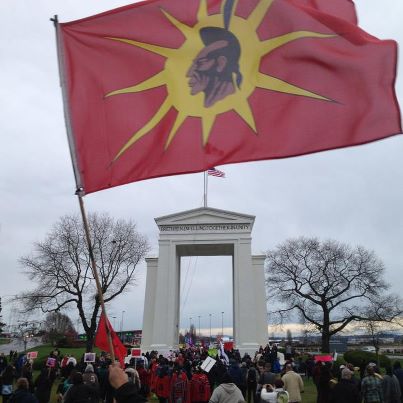Change the conversation, support rabble.ca today.
It appears that the Prime Minister has finally decided that he should say or do something about the thousands of people who have been protesting his government’s policies every day for over a month, the hundreds running road and rail blockades, and the 3 people who have been on hunger strikes for 24 (in the case of Elders Raymond Robinson and Emil Bell) or 25 days (in the case of Chief Theresa Spence).
What he has decided to do is to call a meeting for January 11th to discuss “the treaty relationship and aboriginal rights, and economic development.” All this he will do, he says, because “The Government of Canada and First Nations have an enduring historic relationship based on mutual respect, friendship and support.” And, “The Government of Canada is committed to strengthening this relationship.”
This does come as news. Not only the entirely welcome news of a meeting that may lead to the hunger strikers agreeing to end their fasts, as that may avert serious calamity. But to those who have suffered the indignities of the historic relationship, the claim of respect, friendship and support would be news indeed. And to those who have struggled with the Harper government for the past 7 years, the claimed commitment to strengthening that relationship is news of a different sort. Newspeak might be more accurate.
It was a constant barrage of insults and attacks from the federal government that led to the current situation. Those began with the annulment of the Kelowna Accord amidst ridiculous mischaracterizations from Conservatives. That was followed by a series of legislative attempts to reduce the role of First Nation governments to those of administrative operatives for the Government of Canada. Throw in the cancellation of the long-form census so that we can no longer generate reliable data on what is happening on the ground to Indigenous peoples, meaning that all policy will be ideologically driven, as Mr. Harper prefers. And, of course, there is the gradual diminishment of funding for Aboriginal organizations that did not toe the party line in an attempt to ensure that there are no voices to disagree with him.
On January 11th, the Prime Minister won’t offer to recall the 8 bills currently in the House of Commons or Senate that diminish Indigenous rights or those he has already passed. He certainly won’t want to repeal Bill C-45 with its attack on both the environment and reserve lands. He won’t increase funding for Aboriginal child welfare to the provincial equivalent (22% higher according to the Auditor General), but will instead keep fighting in the courts to deny any responsibility for discriminating against those kids.
He won’t bring funding for reserve schools to provincial levels, he won’t provide clean water to the 120 communities still waiting for it, and he won’t build the needed 85,000 houses. He won’t do those things because his real commitment is to the assimilation of First Nations citizens into the broader body politic, the gradual erosion of the Aboriginal and treaty rights recognized in Canada’s constitution and the exploitation of reserve lands by private enterprise. He is now and will continue to be so committed. We know this because this is what he learned from his friend and mentor, Tom Flanagan, and because he has shown it to be true every day since coming to power.
Let us not forget that neither #IdleNoMore (INM), nor the broader ongoing struggle for Indigenous rights ever boiled down to a hunger strike. That gesture symbolizes the extreme frustration and despair from which it is borne, but it does not define the ongoing fight. If this meeting helps avoid the specific human tragedy of losing three lives, that will be validation enough for it to take place. But the work that INM undertook and that Indigenous leaders have been labouring at for generations will not end with this meeting, not in the least.
Indigenous leaders cannot walk away from a meeting on January 11th with a handful of the same empty platitudes about the federal government’s intentions. Neither INM nor allies in the Canadian public can allow them to do so. Without concrete action and firm accountability from Canada, accepting more of the same would set progress back further than if this protest hadn’t started at all. The test that this meeting presents is of our commitment — the commitment of all Canadians — to continuing the fight to redress injustice and to showing respect for Indigenous rights that to date has never existed. How we demonstrate the level and extent of that commitment is up to us.




